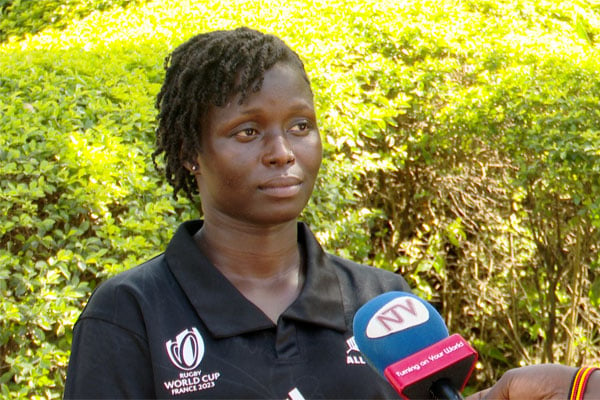
Nahiya Faisal Faruku during the interview. She says she thought the war would last for not more than one week. PHOTO/DANIEL KIBET
When the bullets started flying in Sudan’s capital Khartoum on April 15, 2023, Nahiya Faisal Faruku was in her apartment with her friends. She was a mass communication graduate having studied at the International University of Africa in Khartoum, and one of the few Ugandans who were in Sudan at the time.
Twenty-seven-year-old Faruku says she was not scared at first because there had been a series of demonstrations in Khartoum weeks before the actual war started and she was used to bullet sounds.
She says she thought the war would last for not more than one week.
Little did she know that the fighting would intensify and go on and on. Two top Sudan military Generals; Abdel Fattah al-Burhan, who is the de facto ruler of Sudan, and Hamdan Dagalo, the commander of the paramilitary Rapid Support Force were wrestling for power.
Faruku would later realise that the war was not about to stop and their only option was to stay inside and not risk their lives.
“ We were indoors for six days. You could not go outside because the soldiers would beat you. We used to pray a lot. I actually thought I was going to die anytime,” she says. Luckily, Faruku and her friends had stocked enough food just before the war started. They survived on this food hoping that the situation would calm down. Her worried family back home in Uganda frequently called her to inquire about her safety.
“There is a day the bombing was too much. I called my brother and told him I was going to die any moment. I told him to rush home and give my mum the phone so I could tell her my last words. He advised I pretend as if everything was normal so my mum does not get to worry a lot about me,” she says.
“I assured her that I was well and hoping to be evacuated from Khartoum,” she adds.
On the seventh day of fighting, Faruku and her friends got lucky. A bus that was evacuating Kenyans caught in the conflict picked them. However, they had no time to pack any luggage.
All she could pack was three shorts yet she had earlier bought a lot of goods for her family members back at home. She had no choice but to leave them behind. She also left her academic documents behind and has never got them.
Evacuation efforts
They were taken to the border between Sudan and Ethiopia where they spent a night before proceeding to Ethiopia the following day. It is here that she met other Ugandans who had been evacuated from Sudan in an operation masterminded by Gen Muhoozi Kainerugaba, the then senior presidential adviser-in-charge of special operations.
All along, the Embassy of Uganda in Khartoum had been sending safety alerts to Ugandans in Sudan via WhatsApp.
Faruku and more than 200 other Ugandans boarded a Uganda Airlines plane that had been chartered by the government and they landed safely at Entebbe airport on April 27, 2023.
Finally, after 12 days of anxiety, she was reunited with her family. Although she is glad she escaped death, Faruku has found it hard to cope with life at home. She is jobless yet she had secured part-time jobs in Khartoum that were earning her substantial money.
“I am used to holding my own money and not receiving it from anybody. Not even my parents but now life here is extremely hard,” she says.
Faruku suffered trauma which has made her life more complicated. She has since resorted to playing rugby in a bid to relieve the stress.
Despite what happened, Faruku says she could return to Sudan in the future to continue life there.The war that got her running for safety marked one-year last week. The warring sides are still at war and bullets are still flying just like when she left.
The United Nations estimates that more than eight million people have fled their homes since the war broke out. Nearly 1.8 million Sudanese people have escaped across the country’s borders while thousands of others have been killed.
United Nations Secretary-General António Guterres remarked last week that the world is forgetting about the people of Sudan. He said half of the country’s population needs life-saving assistance “ but they need more than humanitarian support. They need an end to the bloodshed. They need peace. The only path out of this horror is a political solution.”
The effects
A year of war between Sudan’s army and the paramilitary Rapid Support Forces (RSF) has driven more than 8.5 million people from their homes, creating the world’s largest displacement crisis and uprooting families multiple times as people struggle to escape to neighbouring countries with economic and security problems of their own.
Financial challenges have led some to return to the war-stricken capital.
Sudan’s war erupted on April 15, 2023, over a planned political transition under which the army, led by Abdel Fattah al-Burhan, and the RSF, led by Mohamed Hamdan Dagalo, known as Hemedti, were competing to protect their interests.
Fighting tore through the capital and unleashed waves of ethnically-driven violence in the western region of Darfur, before spreading to other areas including Gezira state, an important farming region that became an aid hub where many had sought refuge.
When the RSF entered the state’s main city Wad Madani in December, looting and occupying neighbourhoods as they had done in the capital, many were uprooted for a second time.


